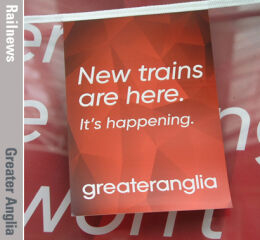Posted 10th October 2025
Countdown is on for next renationalisation

Another former franchise is to pass back to public ownership on Sunday morning, when Greater Anglia will be taken over by DfT Operator.
Greater Anglia was created in 2004 by combining Anglia Railways, First Great Eastern and the West Anglian routes of WAGN. The new franchise was won by National Express, which called it ‘One’ Railway until 2008.
GA became an Abellio contract in 2012, and 40 per cent of the contract was sold to Mitsui in 2017.
Abellio’s share was acquired by Transport UK Group in early 2023, and by then the former franchise had become a National Rail Contract.
Greater Anglia’s managing director Martin Beable said: ‘We’re proud to be one of the highest performing UK train operators in the country, recently recognised with the Passenger Operator of the Year award for the second year running. We’ve introduced new trains on every service, enhanced accessibility across our network and welcomed more local passengers than ever before – achievements made possible by the dedication of our people.
‘Moving into public ownership is an exciting opportunity to build on this success. By working more closely with the wider family of publicly owned operators, we can share expertise, drive innovation and deliver even better journeys for our passengers across the Anglia region.
‘This transition also brings us one step closer to Great British Railways – a simpler, more unified network that puts passengers at its heart. Together, we can create a railway that drives growth, sustainability and pride for the communities we serve.’
The Department for Transport is paving the way for Great British Railways, which will take charge of the passenger operators and also Network Rail, by setting up single management groups in each region.
The Anglia region will be led by Jamie Burles, who was formerly managing director of Abellio Greater Anglia and has now been appointed as Integrated Managing Director (Designate) for the Anglia region.
He is to establish a unified Executive Leadership Team by bringing together Network Rail Anglia, c2c and Greater Anglia. c2c was renationalised on 20 July this year.
The next operators to be renationalised will be West Midlands Trains on 1 February 2026, and then Govia Thameslink Railway, which operates as Gatwick Express, Great Northern, Southern and Thameslink, on 31 May.
The DfT has also said the next two, later next year, will be Chiltern Railways and Great Western Railway, on dates which have yet to be fixed.
Meanwhile, the Bill to create Great British Railways is set to be debated by Parliament this autumn, and should become law in the first half of next year.
Readers’ comments
The basic idea seems to be eventually to have a nationwide nationalised passenger railway, with peripheral private sector operations taking speculative risk in addition. In seeing a logic of "horses for courses" in this, I would suggest the dividing line here ought to be not between a nationalised monolith and a few "icing on the cake" bits and bobs, but should be dependent on the operation being a captive market natural monopoly or not. Such monopolies need to be accountable, ideally needing a form of public ownership with direct democracy (not necessarily Nationalisation). Other passenger services that perform at their best in a role of commercial competition should be free to do so. If this were to ever be put into practice, a coherent set of incentivising subsidies and charges would be needed to represent "hidden" costs and benefits; the DfT would perhaps be better suited to construction of such a framework than trying to run the railway by diktat.
David C. Smith, Bletchley
[The intention is to unify 'track and train' as far as possible. The DfT will not be running the railway but setting broad 'high level' policy.--Ed,]
Of course, the DfT will not be managing the railway on a day to day ‘coal face’ basis, but it seems to me that GBR is in danger of management by conformist bureaucrats(1), rather than by railmen/women such as Chris Green and Adrian Shooter. If vertical integration is an aim, how could the freight companies avoid sharing infrastructure clashes with GBR passenger service? On the one hand, my guess is that problems of this sort would be minimised through progress with IT/AI (2).
David C. Smith, Bletchley
[(1) Is there evidence for this? The government has said precisely the opposite. (2)The railways managed fairly well without AI for 200 years, but the problem of delays involving open access services (which include freight) is indeed a real one. GBR will have to work it out – using humans, I hope.--Ed.]
What do you think? Click here to let us know.
